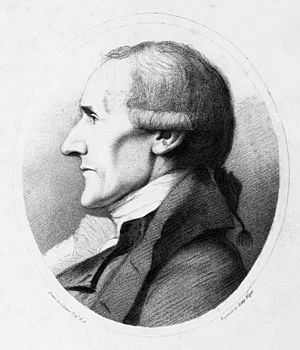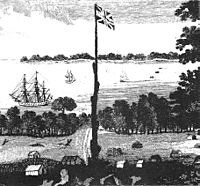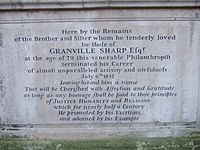Granville Sharp facts for kids
Granville Sharp (born November 10, 1735 – died July 6, 1813) was a very important British person. He was one of the first people to fight for the end of the slave trade in Great Britain. He also worked hard to fix other unfair things in society.
Sharp helped create a plan for black people to settle in Sierra Leone in Africa. He started a company called the St George's Bay Company, which later became the Sierra Leone Company. His efforts led to the creation of the Province of Freedom and later Freetown, Sierra Leone. Because of this, he is seen as one of the people who helped found Sierra Leone. Granville Sharp was also a smart person who studied the Bible and old languages. He was also a talented musician.
Contents
Life of Granville Sharp
Granville Sharp was born in Durham, England, in 1735. His father was Thomas Sharp, a church leader and writer. Granville was one of many children. He had eight older brothers and five younger sisters.
When he was 15, Sharp became an apprentice to a linen-draper in London. He loved to debate and learn. One of his fellow apprentices was a Unitarian, so Sharp taught himself Greek to argue with him. Another apprentice was Jewish, so Sharp learned Hebrew to discuss religious ideas.
In 1757, Sharp finished his apprenticeship. He then got a job as a clerk at the Ordnance Office in the Tower of London. This job gave him lots of free time to study and follow his interests.
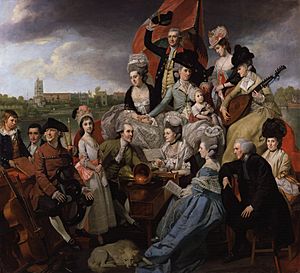
Granville Sharp loved music. Four of his brothers and sisters also lived in London. They often played music together as a family orchestra. They gave concerts at his brother William's house and on their sailing boat, Apollo. This boat was on the River Thames in Fulham. Granville Sharp had a great bass voice. King George III even said it was "the best in Britain." He also played many instruments, like the clarinet, oboe, and harp. He even made his own double-flute!
Granville Sharp died on July 6, 1813, at Fulham House. He was buried in the churchyard of All Saints' Church, Fulham. A special memorial for him was put up in Westminster Abbey.
Fighting Against Slavery
Granville Sharp is most famous for his tireless work to end slavery. He disliked any kind of unfairness in society.
Helping Jonathan Strong
Sharp's fight against slavery began in 1765. His brother, William, was a surgeon who helped poor people. One day, they met Jonathan Strong. Strong was a young black slave from Barbados. His master had beaten him badly and left him for dead.
The Sharp brothers helped Strong. They paid for his hospital care, which lasted four months. After he recovered, they found him a job.
In 1767, Strong's former master saw him and tried to sell him again. Slave catchers captured Strong. But Strong managed to send a message to Granville Sharp. Sharp went to the Lord Mayor of London, who freed Strong because he was held without good reason.
However, the slave owner's lawyer sued Sharp. Sharp found that English law at the time often sided with slave owners. He believed this was wrong. He spent the next two years studying English law. He wanted to prove that slavery went against people's natural rights. The lawsuit against Sharp was eventually dropped. Jonathan Strong was free, but he died five years later at age 25.
Growing Involvement
The Jonathan Strong case made Granville Sharp known as a "protector of the Negro." Other enslaved people asked for his help. But the judges, especially Lord Mansfield, avoided making a clear decision about slavery. At this time, Britain was heavily involved in the Atlantic slave trade. This trade was very important to the British economy.
In 1769, Sharp wrote a book called A Representation of the Injustice and Dangerous Tendency of Tolerating Slavery .... This was the first book in England to attack slavery. He argued that all humans should be equal, no matter what laws society made. He also said that a person's freedom was too valuable to be bought or sold.
The Somerset Case
On January 13, 1772, Sharp was asked to help James Somerset. Somerset was an African man who had been brought to America as a slave. He was then taken to England. In England, he ran away but was later caught. His master planned to send him to Jamaica to be sold again.
This was a perfect case for Sharp. Three Londoners asked Lord Mansfield for a special order called a habeas corpus. This order meant Somerset had to appear in court. Many people sent money to help pay for Somerset's lawyers.
Sharp used his strong knowledge of the law to help Somerset's lawyers. Lord Mansfield took a long time to decide the case. Finally, on June 22, 1772, he gave his judgment. It was a big win for Somerset and Sharp! Mansfield said that English law did not allow slavery. He also said that a slave became free the moment they stepped onto English land.
This decision was a huge step in the fight against slavery. But it did not end all slavery in England. It only meant that people could not be forced to leave England and be sold into slavery overseas. Still, it had a massive impact on the movement to abolish slavery worldwide.
The Zong Massacre
In 1781, a terrible event happened on a slave ship called the Zong. The ship was carrying too many enslaved people. The crew threw about 132 enslaved people overboard into the sea. They did this because they were running out of water. They hoped to claim insurance money for the "lost cargo."
The ship owners, from Liverpool, tried to get insurance money. The insurance company disagreed. In the first court case, the owners won. But the insurance company appealed.
On March 19, 1783, Olaudah Equiano, a famous freed slave, told Sharp about the Zong massacre. Sharp immediately got involved in the court case. The judge ruled that the Zong owners could not claim insurance. He said they had managed the ship badly by not having enough water. However, no one was charged with murder for killing the enslaved people. Sharp tried to get them prosecuted, but it didn't happen.
The Society for Effecting the Abolition of the Slave Trade
Granville Sharp was not alone in his fight. Quakers, especially in America, were also against slavery. Sharp wrote many letters to Anthony Benezet, a Quaker abolitionist in Pennsylvania.
On May 22, 1787, a new group was formed: The Society for Effecting the Abolition of the Slave Trade. Sharp was chosen to be the chairman. But he was so humble that he always arrived late to meetings to avoid taking the chair. The group wanted to end the slave trade, but Sharp wanted to end slavery itself. Even though he was out-voted, he worked very hard for the Society.
Ending the Slave Trade
When Sharp heard that the Act of Abolition had passed on March 25, 1807, he was overjoyed. He was 71 years old. He had outlived most of the people he had worked with or against. He was seen as a wise old leader of the abolition movement. Other people like Thomas Clarkson and William Wilberforce later took over the main leadership. Sharp died on July 6, 1813, before slavery was completely abolished.
The Province of Freedom
In the 1780s, there were about 15,000 black people in Britain. Many of them did not have jobs. People started thinking about creating a settlement in Africa where they could return "home." Henry Smeathman suggested Sierra Leone. Black people worried they might be enslaved again there.
Sharp loved the idea. He saw it as a chance to build a new, fair, and peaceful Christian society. He made plans and rules. He convinced the government to pay for ships and for each person who went. He called this new place "The Province of Freedom."
But the plan faced many problems. A fire broke out before the ships even left London. Sharp's friend, Olaudah Equiano, pointed out corruption, and was fired. Only 411 people sailed to Africa. They arrived in May 1787, at the start of the rainy season. They built a settlement called Granville Town. But the people struggled to build a new life in a difficult environment. One person Sharp had rescued from a slave ship even left to work in the slave trade. By the end of 1788, Sharp had spent a lot of his own money on the settlement. In 1789, Granville Town was burned down by a local chief.
Later, Sharp helped Thomas Peters, a former American slave, to establish Freetown, Sierra Leone. Sharp is considered one of the founders of Sierra Leone, along with Thomas Peters and the Clarkson brothers.
Other Important Work
Granville Sharp also supported the American colonists in their fight for independence. He believed they should have "Equitable Representation" and famously supported the idea of "No taxation without representation." When his job meant sending supplies to British soldiers fighting the colonists, he resigned in 1776. He never had a paid job again, but his brothers supported him so he could work on his causes.
Sharp also wanted to change Parliament and supported Ireland's independence. He fought against the impressment of sailors, which was forcing men into the Navy. Thanks to his efforts, bishops for the United States of America were officially appointed in 1787.
Sharp was also one of the founders and the first President of the British and Foreign Bible Society. He also helped start the Society for the Conversion of the Jews.
Granville Sharp's Rule in Greek
Granville Sharp was also a scholar of ancient Greek. In 1778, he wrote about a rule for understanding Greek grammar. This rule is now known as The Granville Sharp Rule.
The rule says that when two nouns are connected by the word kai (meaning "and"), and the word "the" (ho) is only before the first noun, then both nouns refer to the same person.
This rule was important for understanding parts of the New Testament. It helped people argue for the idea that Jesus Christ is divine. Many scholars debated this rule.
Daniel B. Wallace, a modern scholar, says that Sharp's strong belief in Christ's divinity led him to study the Bible in its original language. He noticed this pattern. Wallace also says that the rule is very specific. It works best when the nouns are singular, refer to people, and are common nouns (not proper names).
Legacy
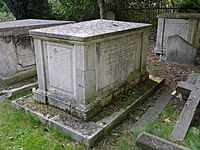
After he died on July 6, 1813, Granville Sharp was buried at All Saints' Church, Fulham. His tomb has an inscription that talks about his life. It says he was a "venerable Philanthropist" who worked for "JUSTICE HUMANITY and RELIGION."
Many portraits were made of Granville Sharp. The National Portrait Gallery, London has several, including a large painting of The Sharp Family.
Besides Granville Town in Sierra Leone, a village in Jamaica called Granville was also named after him.
A memorial to Sharp was put up in Westminster Abbey. He is also shown on the Clarkson Memorial in Wisbech, which honors fellow abolitionist Thomas Clarkson.
In 2007, the Royal Mail released stamps to celebrate 200 years since the abolition of slavery in the UK. Granville Sharp was featured on the 50p stamp.
His tomb at All Saints' Church, Fulham, was restored in 2007. It was also given a special Grade II listing because of its historical importance.
Granville Sharp's important papers are kept at the Gloucestershire Archives. Many of his letters are also at York Minster Library.
Works by Granville Sharp
Here are some of the important books and writings by Granville Sharp:
- 1769 A Representation of the Injustice and Dangerous Tendency of Tolerating Slavery ..., the first book in England to attack slavery.
- 1771 An Appendix to the Representation, adding more to his case against slavery.
- 1774 A Declaration of the People's Natural Right to a Share in the Legislature, supporting the American colonists.
- 1776 The Just Limitation of Slavery in the Laws of God
- 1780 seven writings on The Legal Means of Political Reformation
- 1786 Regulations for a New Settlement of Sierra Leone
- 1790 Free English Territory in Africa
- 1793 A Letter to a Gentleman in Maryland respecting the extreme Wickedness of tolerating the Slave Trade ...
- 1798 Remarks on the Uses of the Definitive Article in the Greek Text of the New Testament, Containing Many New Proofs of the Divinity of Christ, from Passages Which Are Wrongly Translated in the Common English Version, which includes "Sharp's Rule" of grammar.
- 1805 Serious Reflections on the Slave Trade and Slavery Addressed to the Peers of Great Britain
See also
 In Spanish: Granville Sharp para niños
In Spanish: Granville Sharp para niños
- List of abolitionist forerunners (Thomas Clarkson)
- Mary Sharp
 | Madam C. J. Walker |
 | Janet Emerson Bashen |
 | Annie Turnbo Malone |
 | Maggie L. Walker |


